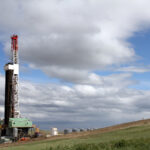From the Associated Press/O.Canada.com
BISMARCK, N.D. — North Dakota is preparing to sue Washington state over a new Washington law requiring oil shipped by rail through that state to have more of its volatile gases removed, which supporters say would reduce the risk of explosive and potentially deadly derailments.
North Dakota officials say the law will make Pacific Northwest refineries off-limits to the energy industry of North Dakota, which is the nation’s No. 2 crude producer. They are also reaching out to other oil-producing states to garner support for the lawsuit, which they expect to file within weeks in federal court.
Washington Gov. Jay Inslee signed the bill into law Thursday. It requires a lower vapor pressure limit for crude shipped by rail than the industry standard and North Dakota requires. Inslee has made climate change a focus of a 2020 Democratic presidential campaign.
Democrat Andy Billig, the Washington Senate Majority Leader who sponsored the bill, said the goal is to reduce the risk from oil being shipped by train from North Dakota’s Bakken oil patch to Pacific Northwest refineries. The volatility of oil trains drew widespread public attention following several explosive derailments, including one in 2013 in Lac-Megantic, Quebec, that killed 47 people.
“We know these trains pose a serious risk as we watch them pass through downtown Spokane in sight of Lewis and Clark High School, hospitals, medical buildings, and senior living facilities,” Billig said. “This bill about safety.”
North Dakota officials view the new law as a potential blow to their state’s oil economy. About 150,000 barrels of North Dakota crude, or about one-tenth of the state’s daily production, is shipped to Washington refineries. North Dakota produces more oil than any other state but Texas.
North Dakota’s three members of Congress last month implored Inslee to veto the bill and the North Dakota’s Industrial Commission, which regulates the oil and gas industry, said it would sue if Inslee signed it.
The Industrial Commission is comprised of the governor, agriculture commissioner and Attorney General Wayne Stenehjem. Stenehjem on Friday said his office is in the “preliminary research stages” of drafting its lawsuit but that it would be filed within weeks. He said it may argue that the Washington statute violates interstate commerce law or pre-empts federal authority.
Stenehjem also has reached out to other oil-producing states about possibly joining as a plaintiff or offering supportive testimony. He did not specify a number or say which states.
“Some have offered help; some I’ve just visited with,” he said.
Stenehjem said he also plans to speak with Washington Attorney General Bob Ferguson as a courtesy.
“I don’t expect him to do anything but defend his law, like I would do,” he said.
The law sets a vapour pressure limit of less than 9 pounds per square inch for oil unloaded from trains, lower than North Dakota’s limit of 13.7 psi and what is considered the national standard for stable crude of 14.7. North Dakota’s limit, implemented in 2015 , builds in 1 psi as a margin of error.
Lowering North Dakota crude to a vapor pressure below 9 psi would require the removal of components such as butane, which is needed as an additive for winter gasoline blends so that vehicles can start in cold weather. That would devalue the product, according to the North Dakota Petroleum Council, a trade group representing about 500 energy companies.
The Washington law requires new refineries and older ones that increase oil volume to adhere to the new vapor pressure standard. Violations could result in fines of up to $2,500 per day per rail car.







